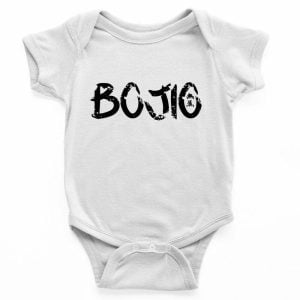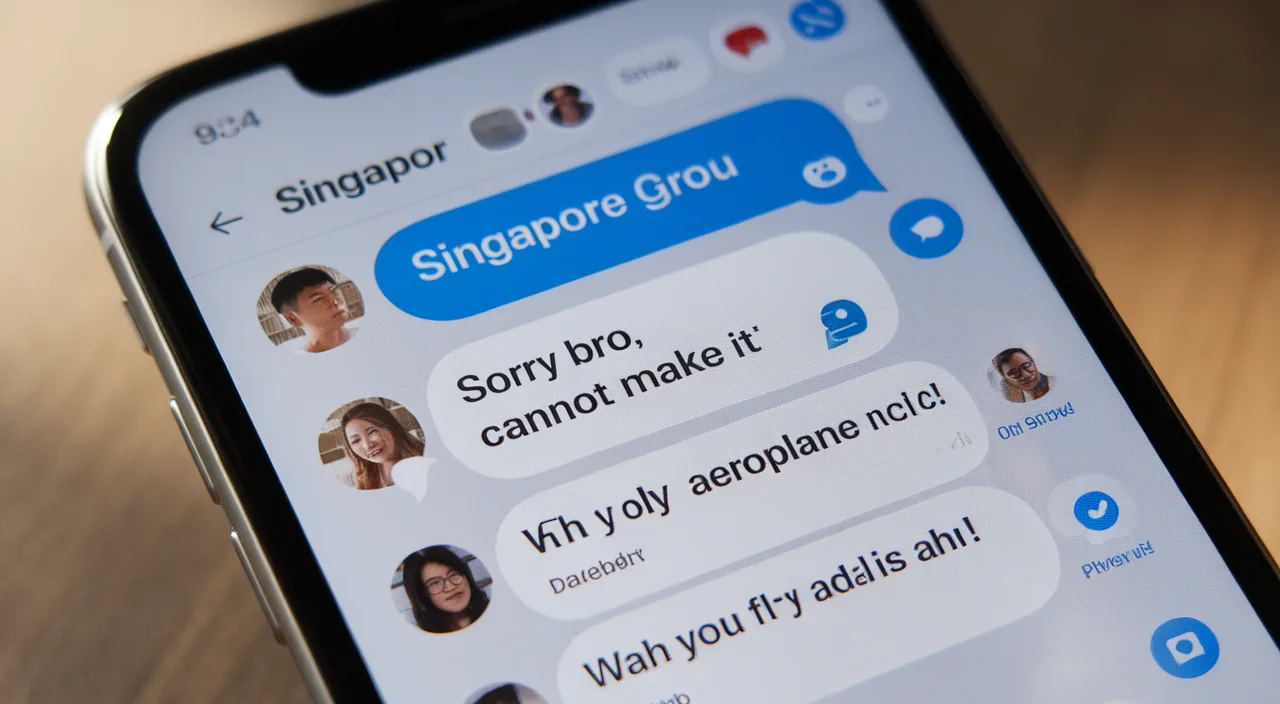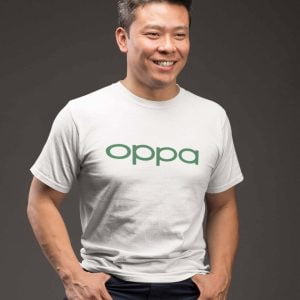What does ‘fly aeroplane’ mean in Singlish, and why using it too often might make you too local?
Short Answer: In Singlish, ‘fly aeroplane’ means to bail on someone last minute — usually after making plans. Using this Singapore slang too often not only reveals your intimate understanding of local expressions but might also signal to others that you’re full-blown Singaporean inside and out — with all the cultural connotations that come with it.
-
Grunge, hokkien, Romper, singlish, Typography
$25.00 Select options This product has multiple variants. The options may be chosen on the product page
- ✔️ ‘Fly aeroplane’ is Singapore slang for cancelling last-minute or not showing up after making plans.
- ✔️ Originated from visual metaphor — your friend “takes off” and disappears like an aeroplane.
- ✔️ Commonly used among Gen Z and young professionals in casual chat, especially on WhatsApp or Telegram.
- ✔️ Overusing this Singlish phrase can peg you as sangat (very) local, which is both a badge of honour and… sometimes a conversational dead-end with non-locals.
- ✔️ We explore how to use, respond to, and avoid flying aeroplane — both literally and linguistically.
The Origins of ‘Fly Aeroplane’
Understanding the Evolution of ‘Fly Aeroplane’
Let’s time travel. Imagine you jio-ed your friends to meet at Kopitiam for some kopi and roti. Everyone says, “On lah.” Then suddenly, *one hour before meeting time*, you receive that infamous message: “Sorry bro, last min cannot make it.” You sigh, roll your eyes, and type one phrase that sums it all: “Wah you fly aeroplane ah.”
The exact origins of this Singapore slang are fuzzy — much like that ambiguous friend who’s “not sure leh” about dinner plans. But the phrase likely stems from the humorous image of someone taking off and disappearing from view, like an uncontactable aeroplane. No radar. No black box. Just gone.
It’s not just funny—it’s poetic. Instead of a cold “cancelled,” we dramatise the act. Your friend didn’t just flake; they took flight using one of our most beloved local expressions.
-
hashtag, KaoBeiKing, Quote, Singlish/Hokkien, T-shirts, Typography
Price range: $30.00 through $38.00 Select options This product has multiple variants. The options may be chosen on the product page -
KaoBeiKing, Parody, Singlish/Hokkien, T-shirts, Typography
Price range: $30.00 through $38.00 Select options This product has multiple variants. The options may be chosen on the product page
Popular Variants & Related Phrases
Singaporean English is nothing if not creative. Related unique vocabularies include:
- ‘Half-past six’ – Not dependable or of questionable quality (yes, can describe a friend).
- ‘Don’t smoke me ah’ – Don’t bluff me.
- ‘Kena aeroplane’ – Being the victim of a fly aeroplane situation.
Each has its flair, but the MVP of emotional sabotage? Confirm is ‘fly aeroplane’.
Incorporating ‘Fly Aeroplane’ in Daily Conversations
Practical Tips for Using ‘Fly Aeroplane’ Naturally
Not sure how to use this delightful Singlish phrase without sounding like you’re trying too hard? Here’s how to blend it into your daily lexicon smoothly:
- Over text: “Eh don’t fly aeroplane again hor, last time already kena!”
- At work (casually): “Michael always say he’ll join lunch but every time fly aeroplane leh.”
- With friends: “Wah, she fly aeroplane more than Scoot nowadays.” (bonus points for airline pun)
The key? Know your audience. Avoid it in formal settings. But among kaki (friends)? Go wild, lah.
Benefits of Using Singlish in a Multicultural Society
While some frown upon heavy Singlish phrases usage, it serves a real purpose. It builds community. Using Singapore slang like ‘fly aeroplane’ expresses emotion, context, and familiarity—all in a few syllables.
Local expressions like this also act like a cultural handshake—an instant way to say, “We same same, can click.” It’s more than just words. It’s insider language that creates unique vocabularies for our multicultural society.
- ✔️ It’s fast: ‘Fly aeroplane’ = complete situation explained in 2 words.
- ✔️ It’s bonding: The pain of a FOMO plan gone wrong? Truly universal.
- ✔️ It’s expressive: Much more fun than saying ‘she didn’t show up.’
Navigating the Cultural Nuance
Proper Usage and Context of ‘Fly Aeroplane’
Here comes the power move: knowing when not to use this particular Singapore slang.
-
Chinese, KaoBeiKing, Quote, Romper, Typography
$25.00 Select options This product has multiple variants. The options may be chosen on the product page -
KaoBeiKing, Men, Parody, T-shirts, Typography
Price range: $30.00 through $38.00 Select options This product has multiple variants. The options may be chosen on the product page
Using it with a mahjong auntie might get you a confused stare. Saying it at an expat dinner party? Might kill the vibe. Pacing matters when deploying local expressions.
- ✔️ Who to say it to: Close friends, siblings, people raised here.
- ✖️ Who to avoid: Clients, people who didn’t grow up local, or formal encounters.
Of course, if you’re feeling cheeky, use it ironically with foreigners and explain after. It might just add to your Singlish phrases ambassador street cred.
One evergreen rule: never be the one who flies aeroplane too often. No matter how charming your Singaporean English is, flaking will lose you friends—unless your name is Jay and everyone low-key expects it.
Final Thoughts: More Than Just a Phrase, It’s a State of Mind
So what happens when you say ‘fly aeroplane’ too often?
It means you’re home-grown, localised, and possibly at risk of becoming the Minister of Canceled Plans. But beyond the surface, it shows how unique vocabularies can be a lens for identity. It reflects humour, history, and the heartbeat of everyday relationships in Singapore.
And really, who hasn’t kaypoh-ed about someone else’s cancelled plans and replied with a sarcastic “Wah, another plane fly today ah?” It’s just part of the shared Singaporean experience — from kopitiam to MRT, hawker centre to group chat.
In a world of increasing globalisation, these local expressions remind us where we come from — quirks and all.
Frequently Asked Questions
Is ‘fly aeroplane’ considered rude in Singapore?
Depends on context. Among friends, it’s cheeky and common. But in formal settings, maybe don’t use it lah.
What’s the best response if someone flew aeroplane on you?
“Wah lao, again ah? I bring tissue for my tears next time ok.” Mix humour with guilt-tripping for peak effect.
Are there equivalents to ‘fly aeroplane’ in other cultures?
Yes, every culture has a ‘flake’. But ours comes with full cinematic imagery. So shiok.
Can non-Singaporeans use ‘fly aeroplane’?
Sure, but be sure to explain it too—otherwise, people might think you’re literally prepping for Changi Terminal 5.
How do I avoid flying aeroplane in real life?
Easy. Don’t make plans you cannot commit to. Or else risk kena group chat flame war.
Is it okay to call someone out with ‘fly aeroplane’?
If it’s someone close, yes. If not — maybe just ghost back. Lose battle, win moral high ground.
Does ‘fly aeroplane’ appear in official Singaporean English dictionaries?
It’s widely understood and documented in Singlish glossaries. Not ‘Oxford’ official, but legit local lah.








